Verdict
A very good sounding wireless speaker, but one that isn’t quite as smart as it’s being marketed as. Still, where sound quality is concerned, the Edifier MS50A offers an enjoyable clear performance with strong bass.
Pros
- Clear, balanced and powerful presentation
- Easy to use
- Wi-Fi and Bluetooth support
Cons
- Not particularly smart on its own
- Needs an Alexa capable speaker to get the most from it
Availability
- UKRRP: £129.99
- USATBC
- EuropeTBC
- CanadaTBC
- AustraliaTBC
-
Wireless connectivitySupports Wi-Fi, Spotify Connect, AirPlay 2 and Bluetooth 5.0 -
SmartsWorks with Alexa support
Introduction
When is a smart speaker not a smart speaker? It’s a riddle that might have the World’s Greatest Detective (that’s Batman to you and me), scratching his heavily chiselled chin. If he were to investigate it, he might find the answer looked a lot like the Edifier MS50A.
The Edifier MS50A is sold on the promise of being a wireless smart speaker with multi-room support and the ability to stream from the likes of Spotify and Tidal directly. All of that is technically true, but the Edifier is a speaker that comes with a few caveats.
The market is awash with smart speaker types, what skin does Edifier have in this lucrative market?
Design
- Neat and tidy appearance
- Quite big and heavy
- No ports for physical connections
The appearance of the MS50A is in-keeping with Edifier’s D12 but much smaller. The front has a fabric surface with a silver bar that seems to be a stylistic flourish rather than anything that has function. The cabinet is made from wood with a walnut finish and like the D12 the MS50A comes across as classy, simple and natural looking speaker.
The cabinet is sealed and other than a connection for power there are no other ports. There’s no 3.5mm jack, which is not unexpected, but there’s no ethernet for a hardwired connection and that strikes me as an odd omission.
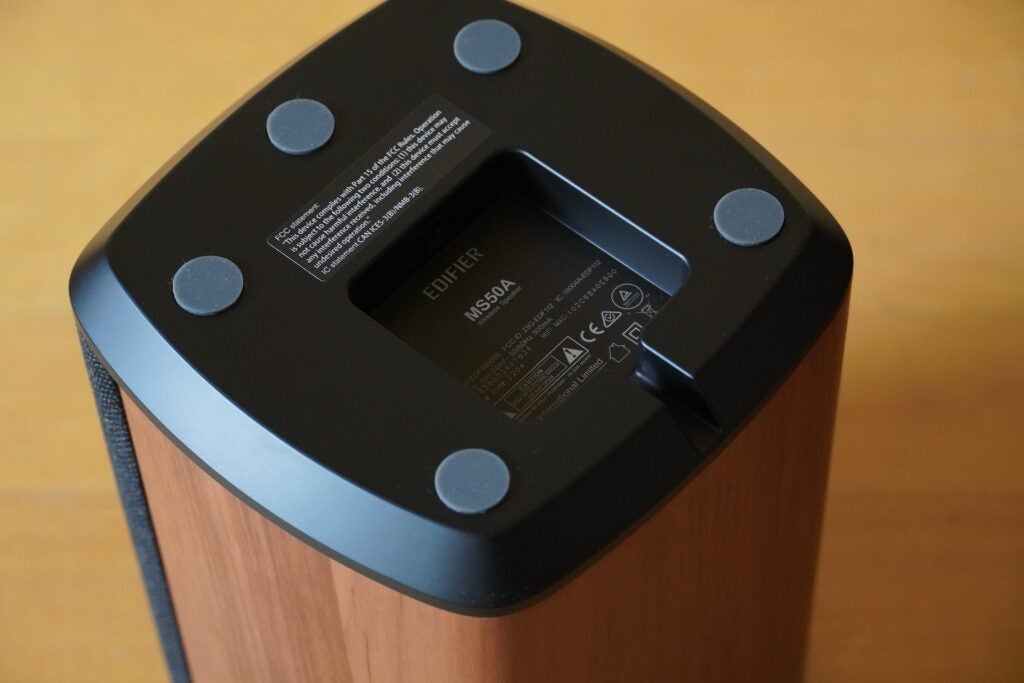
The D12 was tailored for being placed on bigger pieces of room furniture, the MS50A is more accommodating though for what could be called a compact wireless speaker it is much bigger than either the Sonos One or Denon Home 150 and heavier too at 2.26kg. It’s quite imposing for what is a ‘compact’ speaker.
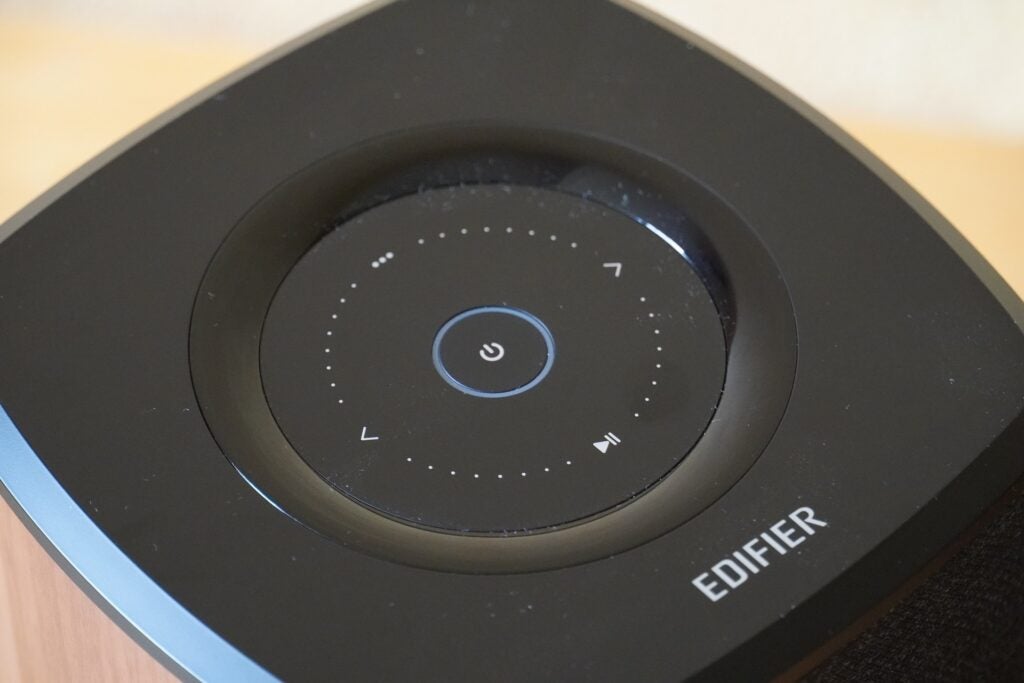
On top is the power button inside a ring of light (white indicates Wi-Fi, blue for Bluetooth) and around it are touch controls for playback (pause, track skipping), volume and Bluetooth/Wi-Fi set-up. Trace a finger counter-clockwise on the dotted circle and that lowers the volume, while clockwise raises it. The controls are an intuitive way of controlling the speaker, the only issue I have is the slight delay in audio responding to the press.
There’s no remote control but given the focus on wireless connectivity, you’ll be using a smartphone or other mobile device as a remote anyway. The MS50A also doesn’t have much in the way of features to necessitate having a remote anyway.
Features
- Spotify Connect, Wi-Fi and Bluetooth
- No built-in microphone
- Works With Alexa certification
The feature set is much sparser than I’d expected for what’s described as a smart speaker. There is an app in the Edifier Home, but the features don’t stretch beyond set-up on a Wi-Fi connection, enabling Amazon Alexa, creating a stereo pair and in-app playback controls.
Of course, there are firmware updates and the ability to change the input, but if you were expecting any level of integration with music streaming services like there is with Denon HEOS, Sonos S2 and Audio Pro apps, then that’s lacking here.
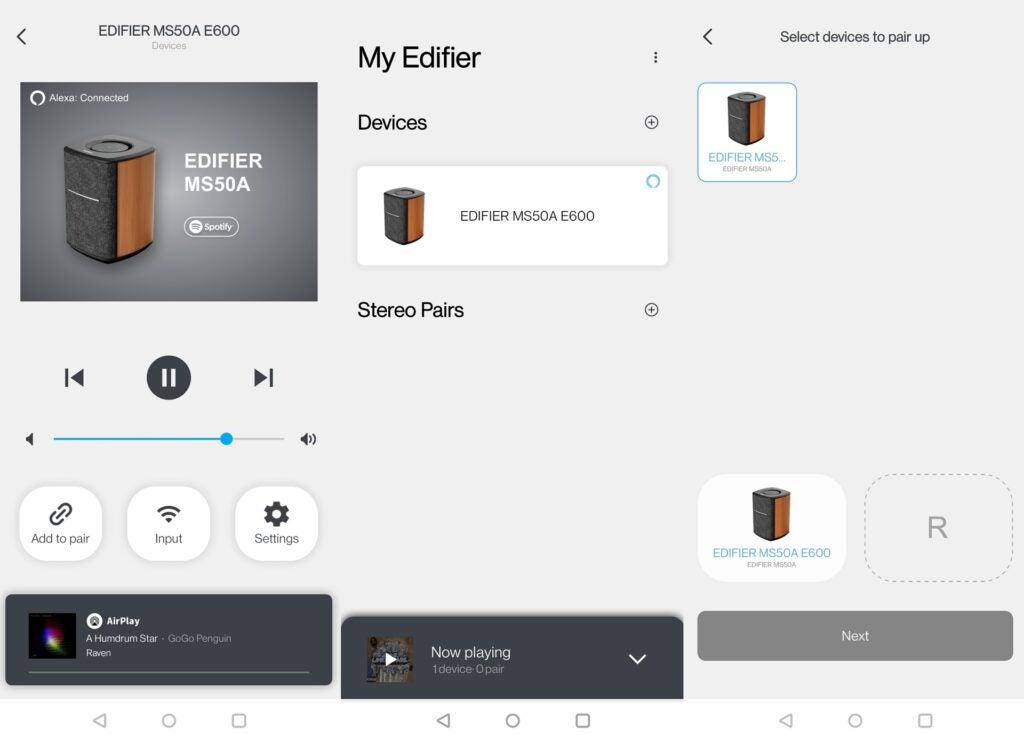
Even the Amazon Alexa integration is something of a misnomer for a smart speaker. The MS50A does not feature a built-in microphone so there’s no support for hands-free voice control. Edifier says on their website it’s done for privacy reasons, but it’d make more sense if a microphone was included that could be disabled.
In truth, the MS50A is more of an accessory speaker than a smart one that with its ‘Works with’ Alexa certification. The idea is that if you want Alexa voice control and smarts, it needs to be connected to an Alexa speaker – an Echo Dot 3rd Gen or 4th Gen would be the obvious contenders – ‘speakers’ where the audio performance could be improved. It does feel like a bait and switch given that the speaker appears to sell itself as a smart speaker, a description that creates some obvious connotations.
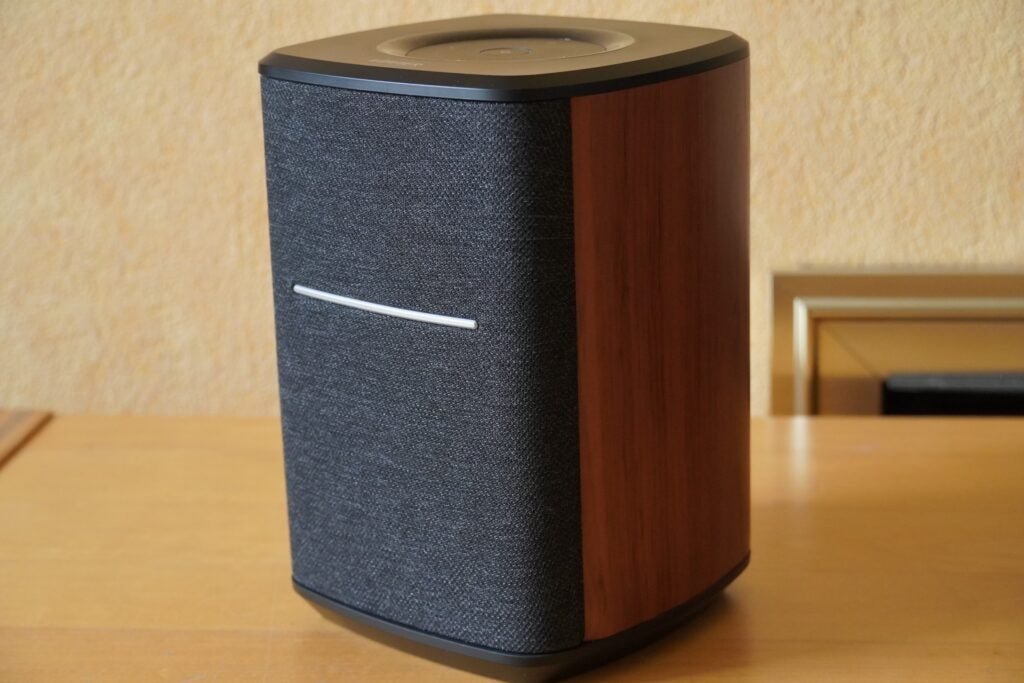
Wireless connectivity extends to Spotify Connect, Bluetooth 5.0 and AirPlay 2, which covers the broad and popular options for music streaming. Tidal Connect is said to be included with 24-bit/192kHz lossless support but the speaker doesn’t pop up in the list of supported devices when I try to play music in the app. Users with iOS devices can get past that with the AirPlay compatibility.
AirPlay, Alexa and Spotify present options for creating a multi-room system with other compatible speakers, while if you purchase two MS50A speakers then they can be stereo paired via the app for creating a desktop speaker system. It’s perhaps here where the lack of ports can be felt with no means to physically connect the speakers to another device.
Sound Quality
- Good power and energy
- Clear, detailed performance
Put those issues aside, however, and the Edifier MS50A can deliver a knockout audio performance. Used in the context of improving upon an Alexa smart speaker and they’re a much better listening experience.
The first thing that strikes me about its performance is its tonal balance. Bass, midrange and high frequencies are all well managed, neither part of the frequency comes across as being too forced or over-emphasised. The MS50A strikes a nice, neutral and balanced approach, with good clarity and detail levels across the frequency range.
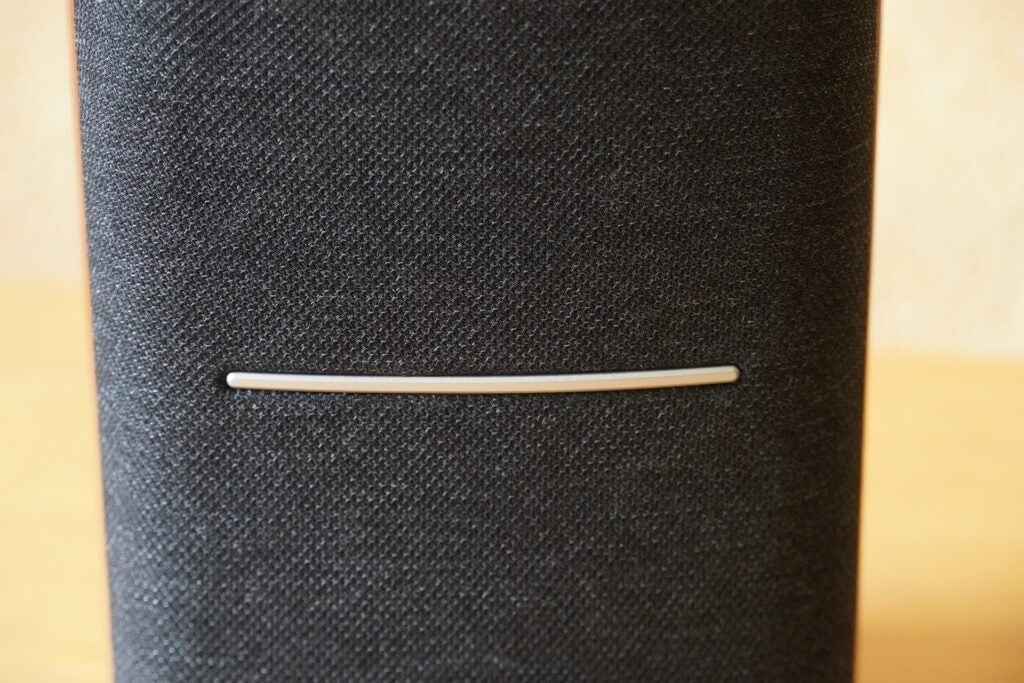
Bass is delivered with punch, weight and purpose in go-to test track GoGo Penguin’s Raven that makes for a rich-sounding performance. There’s energy that underpins the bass performance, but it doesn’t overplay its hand like the Marshall Uxbridge is guilty of doing.
The other end of the frequency range is handled capably enough, the treble piano notes are relayed with clarity and good amounts of sharpness and shine to stand out. The track is also good for hearing the tonal variation of the piano notes and the Edifier captures the difference between each note well.
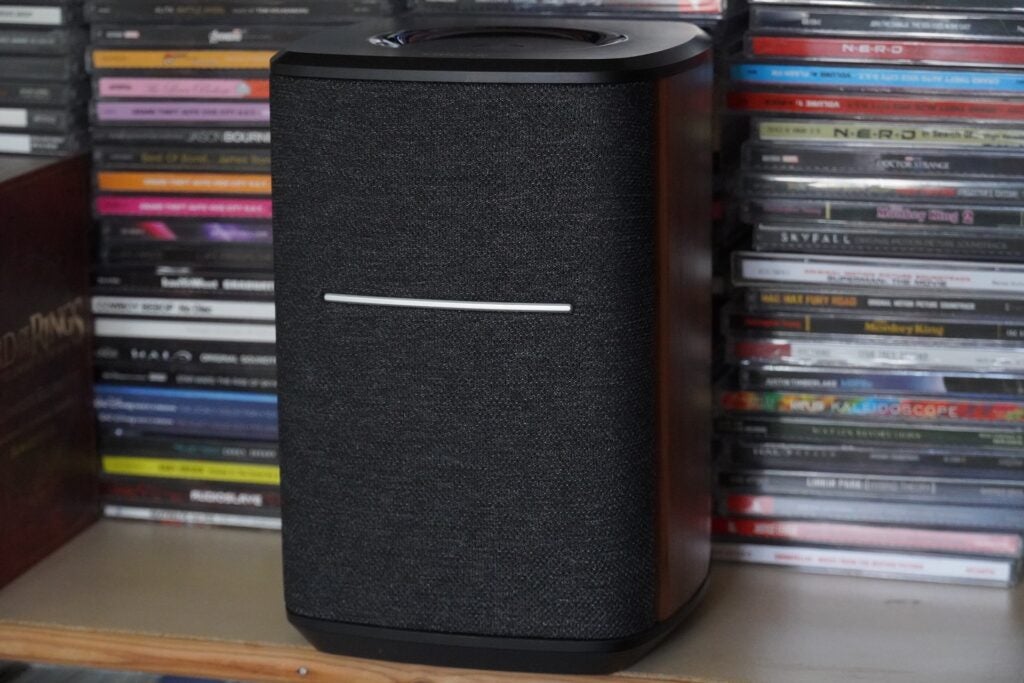
Despite its size, or more its shape, the soundstage isn’t widely dispersed – everything happens within the width of the speaker – but given its bigger than comparative wireless speakers from Sonos and Denon, space within tracks doesn’t feel like it’s a premium.
There’s room for every instrument to stand out, with detail not obscured in Shabaka Hutching’s Black Skin, Black Masks a track with a lot going on as clarinet, double bass and piano flow in and out of the piece. It also shows that the Edifier offers good rhythmic ability, the tempo of the song is constantly changing, the speed at which instruments play is fluid and the MS50A keeps up the pace without muddying the waters.
Vocal clarity is very good too, Lianne La Havas’ voice in Bittersweet is presented with a smooth character is as Alex Isley’s in Love Again, brought to the forefront of the track, big in size and audible over the instruments and beats in both tracks. As a step-up over a cheaper Alexa speaker, the Edifier easily puts in a winning performance.
Latest deals
Should you buy it?
If you want improved sound over your Alexa speaker: For those with smaller Echo Dot devices then purchasing the Edifier makes sense as it does boast an improved sound.
If you already have a decent smart speaker: If you already have an Alexa-capable smart speaker there’s little reason to get the MS50A unless you want a fairly affordable speaker for multi-room purposes
Final Thoughts
To call this speaker a ‘smart’ speaker doesn’t feel quite true, but that may depend on what you think a smart speaker should you be. If we’re talking about a speaker that offers Wi-Fi connectivity and limited smart functionality, then yes, but if we’re talking about voice control and integration with music streaming services then the Edifier MS50A needs assistance from an actual smart speaker to do so.
Nevertheless, it sounds very good for the price, more nuanced and detailed than the similarly priced Marshall Uxbridge. A purchase of this speaker only makes sense if you have an Alexa speaker, otherwise you may find that offerings from Sonos and Denon offer more value and indeed smarts.
How we test
We test every wireless speaker we review thoroughly over an extended period of time. We use industry standard tests to compare features properly. We’ll always tell you what we find. We never, ever, accept money to review a product.
Find out more about how we test in our ethics policy.
Compared to other smart speakers
Tested with real world use
FAQs
The MS50A doesn’t feature any built-in Alexa support because it doesn’t have any integrated microphones. For it to to support Alexa voice control it needs to be partnered with an Alexa-capable speaker.
Sustainability
Trusted Reviews’ holds the fact that global warming is not a myth as a core value and will continuously endeavour to help protect our planet from harm in its business practices.
As part of this mission, whenever we review a product we send the company a series of questions to help us gauge and make transparent the impact the device has on the environment.
We currently haven’t received answers to the questions on this product, but will update this page the moment we do. You can see a detailed breakdown of the questions we ask and why in our sustainability info page
Jargon buster
Bluetooth
Bluetooth – named after 10th-century Danish king Harald Bluetooth who united Denmark’s tribes into a single kingdom – is a method of wireless transmission that allows for the exchange of data between devices over short distances.
AirPlay 2
AirPlay 2 is the second generation of Apple’s proprietary wireless streaming tech, which is built into all of its hardware products (and supported by many others). It’s designed to pass content from your Apple device – music, video and photos – to a compatible receiver over your Wi-Fi network such as a TV, wireless speaker, AV receiver etc.
Verdict
A very good sounding wireless speaker, but one that isn’t quite as smart as it’s being marketed as. Still, where sound quality is concerned, the Edifier MS50A offers an enjoyable clear performance with strong bass.
Pros
- Clear, balanced and powerful presentation
- Easy to use
- Wi-Fi and Bluetooth support
Cons
- Not particularly smart on its own
- Needs an Alexa capable speaker to get the most from it
Availability
- UKRRP: £129.99
- USATBC
- EuropeTBC
- CanadaTBC
- AustraliaTBC
-
Wireless connectivitySupports Wi-Fi, Spotify Connect, AirPlay 2 and Bluetooth 5.0 -
SmartsWorks with Alexa support
Introduction
When is a smart speaker not a smart speaker? It’s a riddle that might have the World’s Greatest Detective (that’s Batman to you and me), scratching his heavily chiselled chin. If he were to investigate it, he might find the answer looked a lot like the Edifier MS50A.
The Edifier MS50A is sold on the promise of being a wireless smart speaker with multi-room support and the ability to stream from the likes of Spotify and Tidal directly. All of that is technically true, but the Edifier is a speaker that comes with a few caveats.
The market is awash with smart speaker types, what skin does Edifier have in this lucrative market?
Design
- Neat and tidy appearance
- Quite big and heavy
- No ports for physical connections
The appearance of the MS50A is in-keeping with Edifier’s D12 but much smaller. The front has a fabric surface with a silver bar that seems to be a stylistic flourish rather than anything that has function. The cabinet is made from wood with a walnut finish and like the D12 the MS50A comes across as classy, simple and natural looking speaker.
The cabinet is sealed and other than a connection for power there are no other ports. There’s no 3.5mm jack, which is not unexpected, but there’s no ethernet for a hardwired connection and that strikes me as an odd omission.

The D12 was tailored for being placed on bigger pieces of room furniture, the MS50A is more accommodating though for what could be called a compact wireless speaker it is much bigger than either the Sonos One or Denon Home 150 and heavier too at 2.26kg. It’s quite imposing for what is a ‘compact’ speaker.

On top is the power button inside a ring of light (white indicates Wi-Fi, blue for Bluetooth) and around it are touch controls for playback (pause, track skipping), volume and Bluetooth/Wi-Fi set-up. Trace a finger counter-clockwise on the dotted circle and that lowers the volume, while clockwise raises it. The controls are an intuitive way of controlling the speaker, the only issue I have is the slight delay in audio responding to the press.
There’s no remote control but given the focus on wireless connectivity, you’ll be using a smartphone or other mobile device as a remote anyway. The MS50A also doesn’t have much in the way of features to necessitate having a remote anyway.
Features
- Spotify Connect, Wi-Fi and Bluetooth
- No built-in microphone
- Works With Alexa certification
The feature set is much sparser than I’d expected for what’s described as a smart speaker. There is an app in the Edifier Home, but the features don’t stretch beyond set-up on a Wi-Fi connection, enabling Amazon Alexa, creating a stereo pair and in-app playback controls.
Of course, there are firmware updates and the ability to change the input, but if you were expecting any level of integration with music streaming services like there is with Denon HEOS, Sonos S2 and Audio Pro apps, then that’s lacking here.

Even the Amazon Alexa integration is something of a misnomer for a smart speaker. The MS50A does not feature a built-in microphone so there’s no support for hands-free voice control. Edifier says on their website it’s done for privacy reasons, but it’d make more sense if a microphone was included that could be disabled.
In truth, the MS50A is more of an accessory speaker than a smart one that with its ‘Works with’ Alexa certification. The idea is that if you want Alexa voice control and smarts, it needs to be connected to an Alexa speaker – an Echo Dot 3rd Gen or 4th Gen would be the obvious contenders – ‘speakers’ where the audio performance could be improved. It does feel like a bait and switch given that the speaker appears to sell itself as a smart speaker, a description that creates some obvious connotations.

Wireless connectivity extends to Spotify Connect, Bluetooth 5.0 and AirPlay 2, which covers the broad and popular options for music streaming. Tidal Connect is said to be included with 24-bit/192kHz lossless support but the speaker doesn’t pop up in the list of supported devices when I try to play music in the app. Users with iOS devices can get past that with the AirPlay compatibility.
AirPlay, Alexa and Spotify present options for creating a multi-room system with other compatible speakers, while if you purchase two MS50A speakers then they can be stereo paired via the app for creating a desktop speaker system. It’s perhaps here where the lack of ports can be felt with no means to physically connect the speakers to another device.
Sound Quality
- Good power and energy
- Clear, detailed performance
Put those issues aside, however, and the Edifier MS50A can deliver a knockout audio performance. Used in the context of improving upon an Alexa smart speaker and they’re a much better listening experience.
The first thing that strikes me about its performance is its tonal balance. Bass, midrange and high frequencies are all well managed, neither part of the frequency comes across as being too forced or over-emphasised. The MS50A strikes a nice, neutral and balanced approach, with good clarity and detail levels across the frequency range.

Bass is delivered with punch, weight and purpose in go-to test track GoGo Penguin’s Raven that makes for a rich-sounding performance. There’s energy that underpins the bass performance, but it doesn’t overplay its hand like the Marshall Uxbridge is guilty of doing.
The other end of the frequency range is handled capably enough, the treble piano notes are relayed with clarity and good amounts of sharpness and shine to stand out. The track is also good for hearing the tonal variation of the piano notes and the Edifier captures the difference between each note well.

Despite its size, or more its shape, the soundstage isn’t widely dispersed – everything happens within the width of the speaker – but given its bigger than comparative wireless speakers from Sonos and Denon, space within tracks doesn’t feel like it’s a premium.
There’s room for every instrument to stand out, with detail not obscured in Shabaka Hutching’s Black Skin, Black Masks a track with a lot going on as clarinet, double bass and piano flow in and out of the piece. It also shows that the Edifier offers good rhythmic ability, the tempo of the song is constantly changing, the speed at which instruments play is fluid and the MS50A keeps up the pace without muddying the waters.
Vocal clarity is very good too, Lianne La Havas’ voice in Bittersweet is presented with a smooth character is as Alex Isley’s in Love Again, brought to the forefront of the track, big in size and audible over the instruments and beats in both tracks. As a step-up over a cheaper Alexa speaker, the Edifier easily puts in a winning performance.
Latest deals
Should you buy it?
If you want improved sound over your Alexa speaker: For those with smaller Echo Dot devices then purchasing the Edifier makes sense as it does boast an improved sound.
If you already have a decent smart speaker: If you already have an Alexa-capable smart speaker there’s little reason to get the MS50A unless you want a fairly affordable speaker for multi-room purposes
Final Thoughts
To call this speaker a ‘smart’ speaker doesn’t feel quite true, but that may depend on what you think a smart speaker should you be. If we’re talking about a speaker that offers Wi-Fi connectivity and limited smart functionality, then yes, but if we’re talking about voice control and integration with music streaming services then the Edifier MS50A needs assistance from an actual smart speaker to do so.
Nevertheless, it sounds very good for the price, more nuanced and detailed than the similarly priced Marshall Uxbridge. A purchase of this speaker only makes sense if you have an Alexa speaker, otherwise you may find that offerings from Sonos and Denon offer more value and indeed smarts.
How we test
We test every wireless speaker we review thoroughly over an extended period of time. We use industry standard tests to compare features properly. We’ll always tell you what we find. We never, ever, accept money to review a product.
Find out more about how we test in our ethics policy.
Compared to other smart speakers
Tested with real world use
FAQs
The MS50A doesn’t feature any built-in Alexa support because it doesn’t have any integrated microphones. For it to to support Alexa voice control it needs to be partnered with an Alexa-capable speaker.
Sustainability
Trusted Reviews’ holds the fact that global warming is not a myth as a core value and will continuously endeavour to help protect our planet from harm in its business practices.
As part of this mission, whenever we review a product we send the company a series of questions to help us gauge and make transparent the impact the device has on the environment.
We currently haven’t received answers to the questions on this product, but will update this page the moment we do. You can see a detailed breakdown of the questions we ask and why in our sustainability info page
Jargon buster
Bluetooth
Bluetooth – named after 10th-century Danish king Harald Bluetooth who united Denmark’s tribes into a single kingdom – is a method of wireless transmission that allows for the exchange of data between devices over short distances.
AirPlay 2
AirPlay 2 is the second generation of Apple’s proprietary wireless streaming tech, which is built into all of its hardware products (and supported by many others). It’s designed to pass content from your Apple device – music, video and photos – to a compatible receiver over your Wi-Fi network such as a TV, wireless speaker, AV receiver etc.

























